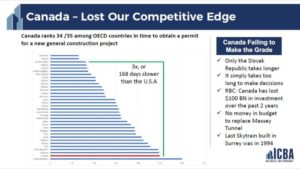The Independent Contractors and Businesses Association hosted its annual CEO Breakfast at Buildex this month to highlight its wages and benefits survey and talk to industry experts about trends in the real estate market.
“ Construction is the unsung hero of our provincial economy. What the 250,000 men and women in construction do accounts for about 10 per cent of our economy,” said Chris Gardner, ICBA president. “It doesn’t get the kind of attention that other industries do.”
Construction is the unsung hero of our provincial economy. What the 250,000 men and women in construction do accounts for about 10 per cent of our economy,” said Chris Gardner, ICBA president. “It doesn’t get the kind of attention that other industries do.”
While the past five years have been some of the busiest for B.C.’s construction sector, Gardner noted some small cracks have begun to appear in the market. He noted that 40 per cent of the association’s members indicated they will be busier this year than last year – the lowest percentage the survey has seen in five years. About 50 per cent of members said they would be as busy this year as they were last.
Gardner said the interior market remains about the same as last year with Vancouver Island and the Lower Mainland experiencing some softening.
“Surprisingly, in northern B.C. the confidence level is not as strong as you might expect,” said Gardner. “The challenge there is that the upstream drilling activity has not started. As of today, there are only 12 gas rigs that are operational in B.C. and that is partly because of delays in the project. So, companies have delayed their drilling activity. And that’s unfortunate because it is impacting jobs and families in northeastern B.C.
“That being said, the construction market is still very strong and healthy.”
The top issue for members remains the same, with 64 per cent of construction contractor members say they cannot find enough workers.
“This issue cuts across our entire economy,” said Gardner. “It’s not just about contractors not being able to find workers. It is in the retail sector, the hotel sector, the restaurant sector. Every sector of our economy is facing a shortage of workers. We are going over a demographic cliff in Canada.”
Many of the trades experiencing shortages are crucial to construction work, including masons, drywallers, iron workers and fabricators. Gardner explained that this has put enormous upward pressure on wages, with the average hourly wage of all trades jumping from $28.32 in 2018 to a projected $32.60 in 2021.
Gardner added that the province has made the situation more dire with the community benefits agreement, which he said excludes open shop workers from major projects like the Pattullo Bridge.
“It’s not fair, it’s not right and it is discriminatory,” Gardner.
The event then switched gears as Gardner sat down for a conversation with Bob Rennie and Andrew Ramlo of the Rennie Group to discuss the current state of the real estate market and the economic and demographic factors that are driving it.
Ramlo explained that as baby boomers age out of the workforce and start to have increased healthcare costs, the population is not growing enough to fill the gaps. The federal government is increasing its immigration targets to try and fill these gaps so there are enough taxpayers to cover these costs.
Rennie noted that later in the decade immigration, despite its political challenges, will need to increase even more.
“My concern 25 years from now is who will be my lawyer, who is going to bring me a bedpan and who is going to pay taxes without immigration?” Rennie said. “You are going to see fractured political parties start to go towards anti immigration policies like Trump. And yes, you get zero unemployment, but you don’t have a sustainable economy.”
Ramlo explained that much of the immigrant population in B.C. will go into the lower mainland. He predicts by 2041, the lower mainland’s population will increase by 1.01 million and require a net of 450,000 new homes to be built.
“We have a crisis coming with all these jobs and without the supply,” said Rennie.
Gardner added that government often makes it more difficult to get supply by increasing red tape and taxes for those trying to develop it.
Ramlo explained that while some have speculated the aging population is poised to free up tens of thousands of homes in the coming decade, it won’t nearly be enough to meet demand.
Rennie noted that there must be ways to increase the amount of housing by taking away some of the political risk of density. He suggested offering $10,000 per door for any application that is approved within 12 months, and $15,000 per door for rental projects. He explained that this revenue could give municipalities the political will they need to build supply.
“We are not going to satisfy the supply chain and keep up with jobs growth and immigration unless we really shrink that approval process,” said Rennie.



